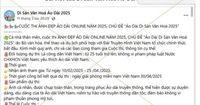A woman in Tra Vinh has fallen victim to a scam, losing over 500 million VND after transferring money multiple times to participate in the "Di san Van hoa ao dai 2025" (Cultural Heritage Ao Dai 2025) contest. On April 11, 2025, the Tra Vinh Provincial Police Department's Network Security and High-Tech Crime Prevention Division reported receiving a complaint from the woman, identified only as Ms. K., who had been defrauded after responding to an advertisement she saw on Facebook.
In March 2025, Ms. K. came across the online ao dai photo contest themed "Di san Van hoa ao dai 2025" while scrolling through her Facebook feed. Intrigued by the contest, she registered her participation. Shortly after, she received a call from someone claiming to be part of the organizing committee, who requested her personal information and photos to proceed with her entry.
After providing the requested details, Ms. K. was added to a Messenger chat group and was instructed to complete three activities to qualify for the contest. The first task was to click on a link to purchase an ao dai for 390,000 VND. Surprisingly, she was refunded her payment shortly after and was even given a commission, which led her to believe the contest was legitimate.
Encouraged by her initial success, Ms. K. continued to participate in subsequent purchases, each time receiving her money back along with additional commissions. However, things took a turn during her third purchase, which amounted to 15.5 million VND. The so-called "organizing committee" claimed that she had missed the deadline for completing her task and would not receive her refund unless she transferred an additional 96 million VND to rectify the situation.
Under pressure and fearing the loss of her already transferred funds, Ms. K. complied and sent the money. The scammers then claimed her credit score was too low, demanding even more funds to secure a full refund. Eventually, Ms. K. transferred a total of over 500 million VND before the scammers cut off all communication once they realized she could no longer send more money.
Realizing she had been scammed, Ms. K. reported the incident to the police. The Tra Vinh Provincial Police Department has since advised the public to be vigilant against such online scams. They recommend that individuals refrain from participating in unverified online contests and avoid transferring money to unknown parties.
In a related note, many people in Vietnam have reported receiving missed calls from strange numbers, leading to growing concerns over potential scams. Ms. Thanh Mai, an office worker in Cau Giay, Hanoi, shared her experience of receiving missed calls from unfamiliar numbers. Initially curious, she called back only to find no one on the other end, leading her to suspect it was a scam.
Similarly, student Ngoc Anh expressed frustration over receiving multiple missed calls late at night from unknown domestic numbers. "I immediately block the numbers when they call," she said, highlighting a common sentiment among those affected by these disturbances.
The phenomenon of "flash calls," where a number rings once or twice before hanging up, has become increasingly prevalent in Vietnam, with both local and international numbers involved. These calls not only cause annoyance but can also lead to anxiety and potential victimization.
Mr. Hoang Minh, a businessman from Hoang Mai, Hanoi, nearly fell into the trap when he received a missed call from a foreign number while driving. Expecting important information from a partner, he was about to call back when his wife advised him to check the number online first. They discovered it was flagged as a scam.
Experts say that scammers exploit human psychology, using curiosity, fear of missing important information, and annoyance to trick individuals into returning calls. Recently, the frequency and sophistication of these "flash calls" have increased, with scammers employing auto-dialer systems to target large lists of phone numbers.
The primary goal of these calls is to verify which numbers are active. When users answer, scammers can confirm the number is in use and add it to their data lists for future scams. Some automated systems can even collect information based on voice recognition and keywords.
While these "flash calls" do not directly steal personal or financial information, they can set the stage for more elaborate scams. Scammers may sell the data to third parties for advertising or use it to create tailored scam scenarios targeting vulnerable groups, such as the elderly or those seeking employment.
Authorities recommend that individuals remain vigilant when receiving such calls, particularly those with a '+' sign at the beginning of the number. If a "flash call" is received, it is best to ignore it and refrain from calling back. Users are encouraged to block persistent numbers and report them to their network operator.
Moreover, individuals should never provide personal information over the phone, even if the caller claims to represent a legitimate organization, such as law enforcement or banks. It is also crucial to avoid clicking on links or installing applications suggested by unknown contacts.
As scams become more sophisticated, the importance of awareness and caution cannot be overstated. The recent experiences of Ms. K. and others illustrate the urgent need for vigilance in the face of increasing online and phone-based fraud.





